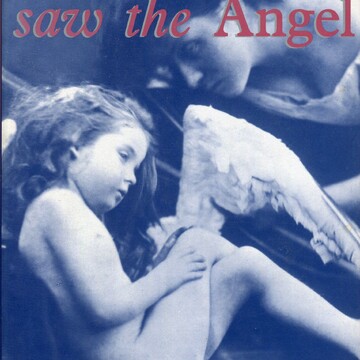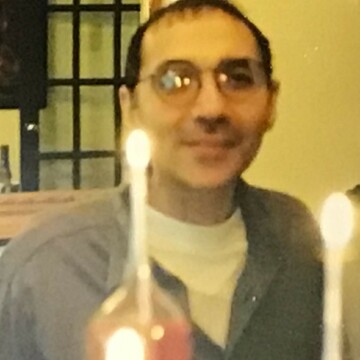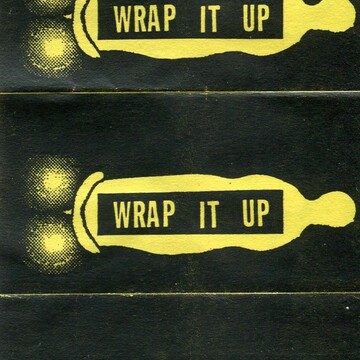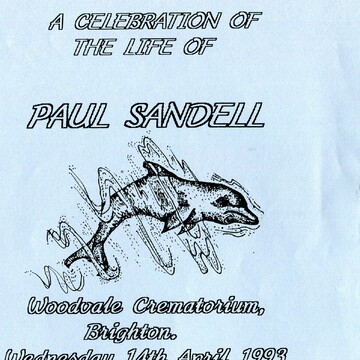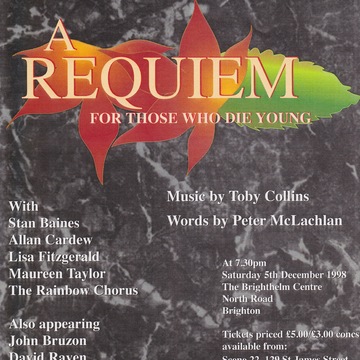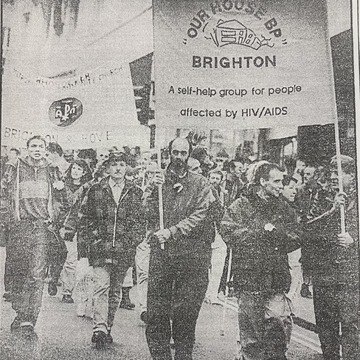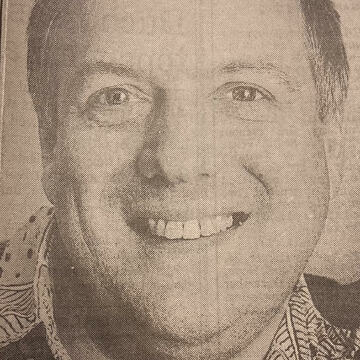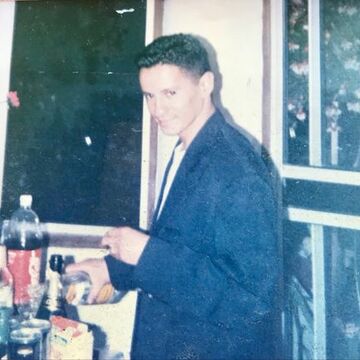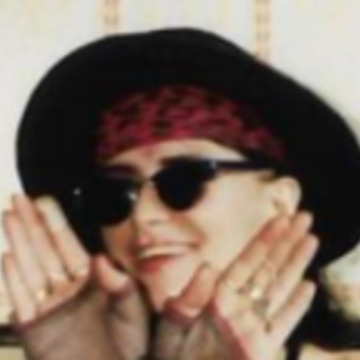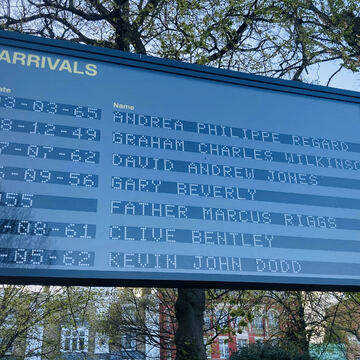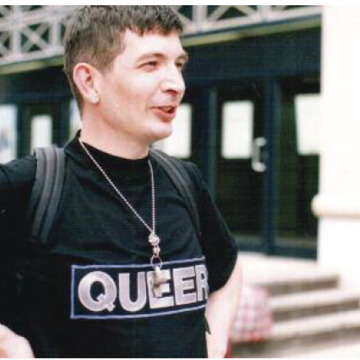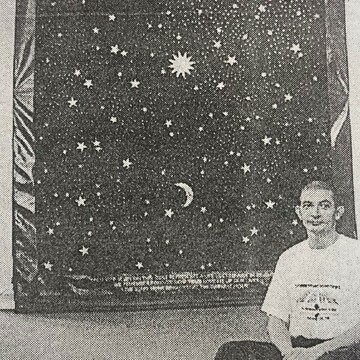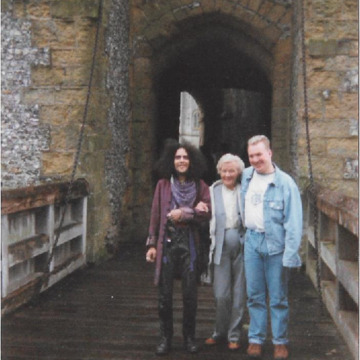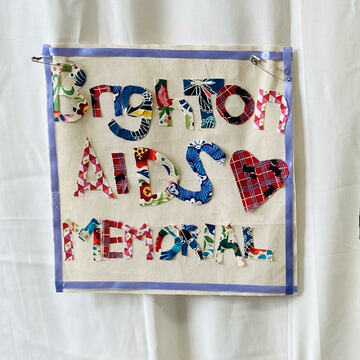Search results
-
'And the Ass saw the Angel' signed 'To the Body Positive with love Nick Cave 1989'
-
David Omar Lambourne, known to his friends as O, came from a Muslim family but he embraced a diversity of faith as an adult, especially Judaism, and he ran a Jewish delicatessen in West Hove for many years. O was an entrepreneur and a dynamic person - a bon viveur who loved to entertain. He was also very interested in food, whether eating, cooking, or running his deli, and one of the best cooks helping out at the Our House Body Positive Sunday lunches. I knew him from the mid 1980’s before either of us became HIV positive, but I lost track of him for a couple of years until we met at an early OHBP meeting. Both he and his partner Stephen had changed their family names, and O changed his first name too. They’d both hated being last on the school register in class – O’s original family name began with Z and Stephen’s with a W. They choose the letters L and C for their new names, so they’d come further up in lists! It was also their way of being reborn, or re launching themselves following their HIV diagnosis. O was a warm and energetic ‘people’ person with great social and communication skills. He was also a Freemason and in the early 1990’s when he was no longer able to work, the Lodge provided him with some financial support. By being openly gay, open about his HIV status and having a Masonic and Muslim background, he certainly tried to break the mould. O had been on many drug trials, but when combination therapy arrived, he didn’t believe it would work and didn’t want to try it - he’d tried enough already. This scepticism was widespread among people living with HIV at that time. Why would this approach work when everything else had failed? The drugs used as monotherapy before combination drugs also had some serious side effects. O died the same summer that combination therapy came into general use.
-
'Wrap it up’ stickers created by Alf Le Flohic that he and I stuck on cash machines around Brighton in the early 1990s to get the safer sex message across.
-
Paul was a gambler. Not only by profession but in many aspects of his life. He lived for the moment, a day at a time. During his extensive travels he fell in love with Africa. A love I shared with him. Gambling and Africa went together nicely as far as Paul was concerned. The smoky atmosphere of the casino nights were blown away by gentle breezes on the Zambezi and Zaire rivers. Paul was also a fisherman, another sport of chance and excitement. He lived the wide open spaces , and the peace, a total contrast to the pressures of the craps and the roulette tables. He would spend hours just preparing his tackle in anticipation of another fishing trip. Paul never really settled anywhere for very long. A typical expatriate he would move on after one or two contracts to the next country, and next challenge. He worked in Zambia, Zaire, Haiti and Bermuda as well as in London and Brighton. His days at the famous ‘Playboy Club’ were related to me with a smile on his face. Halcyon days. Paul was in many ways a private person and not easy to know or understand. He would deal out his thoughts like the poker player he was, he always had an ace up his sleeve but rather used it. He searched for love and contentment and always hankered for the warmer climes of Africa and the Caribbean. To have died on an African airline is somehow sadly apt. I shall miss him. Paul was my friend.
-
A Requiem For Those Who Die Young Flyer (1998)
-
On the 1st December 1991 around 200 people headed by Our House BP marched through Brighton to mark the culmination of AIDS Awareness Week that year. The B&W photo which featured in the Evening Argus, shows Simon Perry (bearded) holding the banner with Kevin Dodd (middle) and his partner Alan holding the banner on the right. On the left of Simon is Jimmy Brown, a Sussex AIDS Centre Helpline (SACH) volunteer. Clive Bentley who was the Information Manager at SACH at the time was quoted as saying ‘I think the challenge is still to convince people that everybody is potentially at risk.’
-
Alan Clarke Alan Clarke was the second director of the Sussex AIDS Centre and Helpline on Cavendish Street and worked hard to raise awareness on AIDS related issues. He made the news in 1991 after calling for Brighton & Hove businesses to give their employees a personal supply of condoms to help stop the spread of the virus. Alan tested positive in 1988, and died peacefully aged 46 on the 31st July 1996. His funeral service took place at Woodvale Crematorium on the 7 August, and as a mark of respect the Sussex Aids Centre and Helpline closed that day. Alan requested that no flowers be sent, but asked instead for donations to the Sussex AIDS Centre Equipment fund and the Sussex Beacon.
-
Andrea Philippe Regard Born - 16 March 1965 – Sao Paulo Died – 13 May 1991 – Ward Six, Hove General Hospital Andrea Philippe Regard was a young talented Brazilian florist who worked at and lived above Jane Greenwoods on Gardner Street. Always a lover of convenience in any shape or form, when my café opened to replace the tool shop opposite, he was overjoyed. Andrea had little need for power tools, unless attached to someone suitably swarthy, but he loved a good coffee. And so it was that after a few trips across the street, he was part of the furniture and a day rarely passed without his presence. Andrea would generally sashay in at around 10am, order a double espresso and then sit at his customary table. He’d stir in six or more sugar cubes, fingers spread like a cockatoo crest, and then announce his presence by calling down the kitchen stairs in a Zsa Zsa Gabor burr. I’d join him for his tales of our city, which usually began in the Bulldog and ended with his legs in the air somewhere in the area. He had a big appetite for large men; the rougher the better - ‘straight’ tradesmen a speciality. They couldn’t get enough of his boyish good looks, big brown eyes and one-liners and nor could I. One day, he came in looking particularly worse for wear, but still smiling as always. My ‘what happened to you’ was met with a wry smile as he recounted a gymnastic session with a plumber from Bath who’d been working away from home and wife. Jack was lean, muscular and six foot two - bingo. After last orders, Jack had lured Andrea back to a nearby derelict building where he was staying and working. They’d fucked like the world was ending, but after a grunting climax, Jack’s face flooded with guilt so Andrea made his excuses and left. Hungry drunk when he arrived home, Andrea decided on a Fray Bentos steak pie which he plunged into a pan of water and set to boil. An hour or so later just as dawn was breaking, he was jolted awake by the exploding pie which had turned the kitchen into an insane scatological Jackson Pollock with added shrapnel, but he didn’t care. ‘It’s a new look darling, they’ll all want it.’ Glitter ball Andrea loved a party, and his 25th birthday was a great excuse to throw one. At the time the cafe was on a roll and the queer place to hang so it seemed a natural choice for a venue. Plans were made and invitations sent out in embossed bespoke envelopes. On the day, we closed early and laboured to transform the space into a palace befitting a queen. It wasn’t quite Versailles, but we did a fine job trying to recreate it with miles of ribbon, sumptuous fabrics, arum lilies and balloons. We hung, draped, squeezed and pinned into every available space. The food had to match the flamboyance, so canapés mimicking the blooms in Andrea’s florist were made – Arum lilies of curled calamari with stamen of sweet pepper, roses of salami and chorizo and devilled egg daisies amongst others. Local shops were stripped of their Champagne and spirit supplies, glasses polished and ice crushed. This was to be the party of the year and everyone invited came - there were no excuses. Shoulder pads, evening gowns and the loudest shirts in Christendom jockeyed to congratulate and adore Andrea. There was a wonderful infectious exuberance in the room, thanks to North Laine traders and the gay scene out for a good time. Before long, hips were shaking to the finest indie, funk and crowd pleasers, as Andrea flitted resplendent in a bespoke Katherine Hamnett suit of black bejewelled fabric that glittered like a night sky. Hindsight explains the weight loss since his measurements were taken. The suit was meant to be roomy and flowing, but I noticed that it hung from him. At the time he would have brushed this off with some excuse about a new diet, but then he was always ‘feeling fat’ and on some diet or another. Of course, looking back now, it’s clear that he was already ill but perhaps unaware. Knowing might have helped him change aspects of his lifestyle, but there was no medication then. Knowledge of your status was not the power to take control it is today, it simply signposted a death sentence, and there was nothing positive about it. He was buried in that suit, no doubt to make a good impression when flirting with St Peter. ‘Lovely wings darling.’ There is a light that never goes out Andrea ate much of his food at the café and usually I’d rustle up something he fancied to order from the supplies at hand. If memory serves, his favourite dish was a steaming plate of pasta with a creamy mushroom and bacon sauce, covered with an inch of parmesan cheese. But a half portion, because he was on a diet, naturally. I first remember concerns circling like black crows when Andrea started to lose his ravenous appetite and more of the little weight he carried on his slight frame. The boyish good looks and olive skin seemed to be fading like fabric left out in the sun. When we spoke about it, he brushed my concerns aside and always seemed to have a perfectly reasonable explanation. I remember him looking me square in the eye and saying there was absolutely nothing to worry about. But a dark anxiety and paranoia raged amongst gay men in those days and even a bad cold would have people jumping to conclusions. I was happy to believe what he told me for my own reasons of denial. Some time passed and I began to notice a swelling on the left side of Andrea’s neck. This time it was an infection that was being treated he said, nothing to worry about, but my fears were back. At the time I was working as a volunteer for the Sussex AIDS Centre and Helpline and could not help but fear the worst. When the swelling grew to the size of an orange, cocking his head to the right I had to share my fears, but any mention of the virus was smothered, the idea dismissed and the subject quickly changed. In hindsight I wish I had done more, but realistically it was already too late. Perhaps I saw, or feared, something in his face that I had already seen before. Very late one night my telephone rang and it was Andrea. He was clearly deeply upset and requested that I come over to see him. I dressed quickly and crossed the empty street as a fox slunk into the shadows. Andrea opened the door in tears and I followed him up the stairs to a kitchen still stained by the Fray Bentos Pollock. We sat at a table holding hands and he confirmed my worst fears. All I remember are three words delivered in a terrified yelp, ‘I have AIDS’ - I moved to cradle his dwindling form in my arms and whispered ‘you’ll be OK’ as our tears soaked my shirt. Beaches Andrea never came back to the café or worked again. He was admitted to Ward 6 at the Hove General Hospital, a place few managed to leave in the early 1990s. The ward was isolated from the rest of the hospital at the very top of the building, hidden away from a public fearful of the ‘gay plague’, but also to protect those staying there. Andrea was popular so there was always someone to visit, and I spent Sundays with him when the café was closed. Whenever he talked about his death, I would try to change the subject because I didn’t want to believe it. Andrea though was reconciled to his fate thanks to a Catholic faith which made him fearless and accepting, but also comforted him like a warm blanket on a cold night. It was his time to go and there was nothing that could be done. We would spend time watching movies together, gossiping, and planning visits to Sao Paolo to see the boys, bars and beaches when he ‘got better.’ Andrea would humour the plans, adding detail and anecdotes from his youth. ‘One day we’ll stroll Rua Oscar Freire looking at the boys’ I’d say, but he knew this would never happen. Over the course of two months Andrea disappeared as the virus asset stripped his body. Each visit would see part of him shaved away and his suffering increased. On good days, when light would break through the clouds of his pain, he would tie up loose ends and sell his belongings so that every available penny could be sent home to his family. ‘How much for this do you think? It’s Paul Smith darling. He sounds so boring, but he makes lovely clothes.’ His resolve was iron and my love and admiration for him grew stronger with each day. When awake he was tenacious but always smiling or trying to make me smile. ‘What do think of my new diet? I wanted to lose weight darling, but this is ridiculous!’ I continued to visit Andrea wrapped in a shroud of denial. No one in my life had died and I couldn’t process the situation or imagine him gone so I avoided thinking about it. It felt impossible and ridiculous that he would not get better, he was only 26 for Christ’s sake. One day Andrea requested the movie ‘Beaches’ which I hadn’t seen. All I knew was that it starred Bette Midler, so I expected something lightweight and funny. As the story of terminal illness and friendship flowed from the screen, I began to sob uncontrollably. Andrea held my hand with a rosary squeezed in between and consoled me. ‘I will die soon, because I’m almost ready. Do you believe in angels?’ I replied that I didn’t, ‘well you must,’ he said, ‘because soon I’ll be watching over you.’ Andrea slipped into a coma and died on the 13th May 1991. He was just 26 years old. I think of Andrea often and it’s natural for me to look up to the sky to say hello. He is the kestrel hovering by the roadside, the jet trail hexagram, the crescent moon. 13 May 2021 - 30 years The wind is strong and sharp today, tumbling clouds across the sky like toddlers running a sack race. But the sun shines through to give the blue greens of the hills and sea a flickering vitality. When its warmth glances against my cheek, it’s as reassuring and welcome as a hand caressing my face. I imagine it’s your hand Andrea and that gives me great comfort. Your grave is covered in grass with sprays of daisies and buttercups. There’s no headstone, but after all these years I find you easily enough, almost by instinct – number LAF265. I crouch down and push my finger into the green, feeling the chill of the ceramic plaque I made for you. A nest of ants has made their home here too, and they climb my arm as I carefully claw at the grass to reveal an outline. I pour water from a flask to wash away the mud and watch the past trickle away. These days the piece is chipped and cracked but the colour is still bright and the arum lily still visible. Despite the efforts of the gardeners and their tractor mowers it holds together, only the yellow stamen has gone. But the damage really doesn’t matter, if anything it’s given the piece the charm of a relic. I carefully wipe it clean and trim the grass with scissors to give a sharp edge, then I frame the plaque with the wild flowers that pepper the lawn. It’s been thirty years Andrea, thank you for watching over me and for keeping me safe.
-
I met Ann Marie and her partner Benjie for the first time in the late 1980s when I volunteered at the Sussex AIDS Centre & Helpline. The pair were inseparable and generally nocturnal, but sometimes they’d be seen strolling along St James’s Street making eyes turn as they passed. Benjie clearly modelled himself on Jimi Hendrix whilst Ann Marie was pure Goth with a slim figure and translucent porcelain skin. You could be sure they'd be the first at the chemist for their Methadone script. Their basement flat on Elm Grove was an Aladdin’s cave festooned with trinkets and fabric, shrouded by curtains which rarely opened. A chaotic space which echoed their lives. It’s no secret that the pair struggled with addiction but they were devoted to each other and somehow managed to survive for a while at least. Due to their vulnerability and poor health, Ann Marie and Benjie were rehoused in a flat on Tyson Place in Kemptown where Avee Isofa Holmes also lived at the time. She remembers Ann Marie as a ‘lovely serene quiet soul’ who was rarely seen unless she needed to borrow shampoo. Ann Marie’s family often visited from Ireland but despaired at her circumstances and lifestyle. Her ravaged immune system struggled with injection related wounds and as a result she was plagued by infections which would eventually prove too much for her. Ann Marie died in hospital in October 1991. Wolf Impala - a poem by Ann Marie published in the the Sussex AIDS Centre Newsletter (1991) In the cave of my brain where pulps a green throbbing light edges stretching bursting at my lovers contact and precious heart in the centre gold shafts oozing juice lubricating my hard strong magical thoughts idealism strikes but pain remains in the cave of my brain singing a sweet backward ballad I feel as many as every human living as mirrored pupiled eyes stare as the globe throws itself smashing against my brains walls a fucking elegant unpolish bang as different countrys continents races feel the impact of the cacophony of billions united inside the cave of my brain I ache an orgasm of love for all
-
Aputheatre Aputheatre began life as the Aids Positive Underground Theatre Company at the Sussex AIDS Centre and Helpline, and was founded by John Roman Baker and Rod Evan to provide a cultural response to the HIV and AIDS epidemic. The company was quick to establish a reputation for hard-hitting queer drama and as a result controversy often accompanied the company's performances. Surprisingly, there was even opposition at the Sussex AIDS Centre and Helpline, which at the time was attempting a mainstream reinvention to secure funding and considered the work too gay and controversial. Crying Celibate Tears was first performed at the Sussex AIDS Centre and Helpline on the 22 May 1989 as part of the Brighton Fringe Festival, and was the only Aputheatre play to be staged there. It was directed by Geoffrey Coleman, and had the following cast – Eric – Andrew St. John David – Tom Sharpstone Jeff – Nigel Greenhalgh Keith - Graham White Aside - Geoffrey Coleman was a regular customer of mine at the time and two Gardners Café chairs were borrowed to dress the set. The Ice Pick was first performed on 21 May 1990 at the Marlborough Theatre as part of the Brighton Festival. The production was awarded the Zap Award for best theatre jointly with the Satyricon Theatre of Moscow. It was directed by Robert Snell, and had the following cast – Michael – Mark Laville Peter – Nigel Fairs Michael’s father – Ted Dawson Adam – Stephen Israel Tim – Stephen Israel Eric – Stephen Israel Man at party – Ted Dawson Freedom to Party was first performed on 14 May 1991 at the Marlborough Theatre as part of the Brighton Festival. The play was directed by Paul Hodson and had the following cast. Mark – Clive Perrott Simon – Nick Miles Alex – Dino G Houtas Paul - Simon Casson The three plays gained national and international recognition when they were performed, and in 1992 they were presented together for the first time as part of Brighton Lesbian & Gay Pride and the Brighton Festival. ‘Men behave with both courage and barbarism during a war. AIDS is the war of the recent past, present and future. If AIDS is a war, then Brighton is a town on the frontline with the highest incidence of HIV and AIDS outside of London. In human terms that amounts to widespread physical and emotional devastation. Our gay community continues to be the hardest hit of all, and our fight is not only against the virus but also against the day-to-day fascism of prejudice and complacency. We must be alert to those around us who are experiencing distress because of our avoidance of AIDS. This can be in the workplace where people are discriminated against because of their HIV status, but equally in our bars, clubs and social environment. But above all we must be vigilant against the prejudice within ourselves.’ – John Roman Baker, 1992. ‘A significant breakthrough in AIDS theatre’ – Plays & Players, 1989 (Crying Celibate Tears). ‘Guaranteed to outrage the bigots! – Derek Jarman, 1991 (The Ice Pick). ‘Takes the audience into uncharted emotional territory’ – New Statesman & Society, 1991 (The Ice Pick).
-
Arrivals + Departures Wednesday 5 May 2021 Artists Yara and Davina create ambitious public artworks that respond to site, context and audience. Their inventive, issue-based work is wide ranging, and uses a lightness of touch that make their works both poetic and universal. Arrivals + Departures invites the public to share the names of those who have arrived and departed on live boards, to acknowledge, celebrate and commemorate. On Wednesday 5 May 2021 Yara and Davina invited me to ‘takeover’ the boards of their Brighton International Festival exhibit in Pavilion Gardens to commemorate the lives of those who died from an AIDS-related illness in Brighton & Hove. It was an honour & a pleasure to be invited to be a part of this wonderful public artwork exploring birth, death, and the journey in between. ‘In the roaring waters, I hear the voices of dead friends Love is life that lasts forever My hearts memory turns to you...’ Andrea Philippe Regard Arrival - 16 March 1965 / Departure - 13 May 1991 Graham Charles Wilkinson Arrival - 08 December 1949 / Died 22 August 1990 (London Lighthouse) David Andrew Jones ‘Cooch’ Arrival - 17 July 1962 / Departure - 18 October 1999 Gary Beverly Arrival - 26 September 1956 / Departure - 23 June 1993 Father Marcus Riggs Arrival -1955 / Departure - 10 July 1998 Clive Bentley Arrival - 07 August 1961 / Departure - 17 August 1994 Kevin John Dodd Arrival - 21 May 1962 / Departure - February 1992 The quoted text comes from the film ‘Blue’ by Derek Jarman.
-
Arthur Law’s Star Quilt is seen here on the start of the Brighton Lesbian and Gay Pride march in 1992. Arthur was one of the Pink Parasol committee responsible for organising the event. As well as being a fearless and committed activist, Arthur was a brilliant designer and a gifted sewer. He also made the Fighting AIDS Brighton banner for Our House Body Positive, which can be seen here displayed on Queens Park railings at the Pink Picnic in 1993. Arthur died on the 17 May 2018 Thanks to Avee Isofa Holmes & www.wildbloodandqueenie.com for use of the images
-
The picture shows Queer activist Arthur Law (21 May 1959 – 17 May 2018) with the panel he made for the National AIDS Memorial Quilt in 1991. There are 133 stars depicted, and each one represents a life lost to AIDS in Brighton. It was displayed alongside other quilts at the Corn Exchange in June 1993 but its whereabouts are now unknown. If you have any information that can help with its location please get in touch.
-
I met Benjie at the care home I was working at on Sillwood Street when he was about 18 years old. He apparently came from a good family in Jamaica and wanted to study to be a vet, but because of his drug problem he’d ended up in the care home. I didn’t see him again for many years until he walked into the Sussex AIDS Centre and Helpline on Cavendish Street announcing his presence with ‘hello pea pod’ when he saw me. It turned out he was also living in the same block as me at Tyson Place! I started training to be a volunteer at the Sussex AIDS Centre when it was based in just one room near London Road. Years later when Princess Diana officially opened the place on the 12th of July 1990, Benjie was there too. When he said ‘how's Charlie boy then’ to her I nearly died, but she took it all in her stride and smiled. When Our House Body Positive was up and running, I organised a trip to Arundel Castle. There were eight of us with my dear friend James Etheridge driving. Benjie asked me if we could go to the Castle café for some hot chocolate. When I turned my head at the counter, I saw Benjie tipping sugar sachets into his hippy bag, and I was horrified. He just grinned and said, ‘we've paid for them.’ He was so beautifully dressed that day in an Edwardian green velvet frock jacket with lacy cuffs and black trousers tucked into high leather boots. One Christmas Eve (his last) I came home at 1 in the morning to be greeted by four fire engines. Thick smoke was billowing from his bedsit and the fire was so bad they had sealed off the entire 3rd floor. I think Benjie stayed at the hospital that night. He came back in the morning and asked me to go upstairs because he thought his cat was still in the flat, but I couldn't find it, or any remains. The fire started because he’d been drinking with a friend and using drugs by candlelight because they’d run out of electricity. Benjie was rehoused, but he sadly passed away the following Easter after a three-day Methadone binge. It was an electric heater that caused a blaze this time, and he died in hospital soon after from smoke inhalation. Words by Avee Tsofa Holmes
-
On the 10 July I joined a workshop at Acorn House in London where the UK AIDS Memorial Quilt was being displayed & made a mini quilt for this collection. Harry


